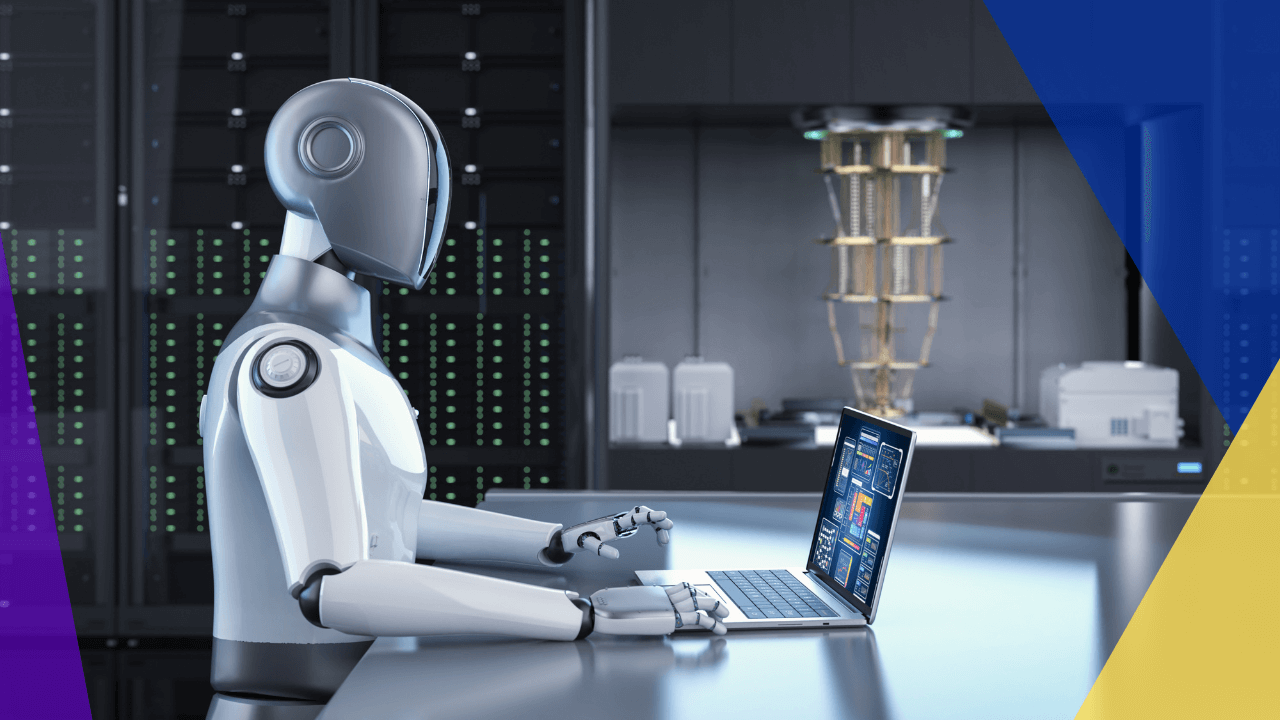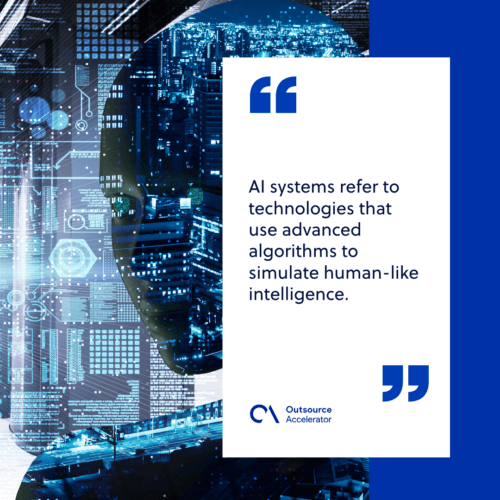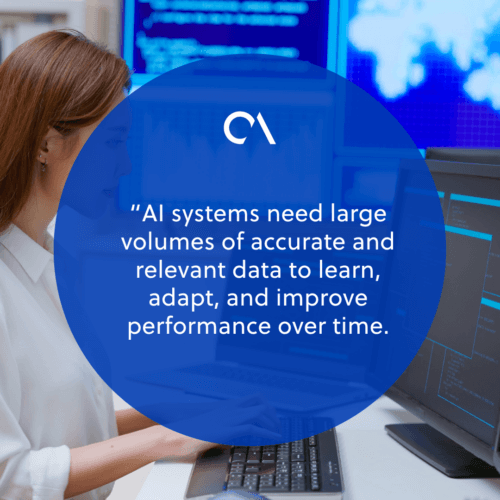15 best AI systems for your business this 2026

List of 15 AI systems
- ChatGPT
- Google Cloud AI
- Jupyter
- IBM Watson AI Software
- Viso Suite
- Azure Machine Learning Studio
- Salesforce Einstein AI Software
- Infosys Nia
- TensorFlow
- Observe.AI
- Synthesia
- C3 AI
- H2O.ai
- DataRobot
- Empower by Ringover
Everywhere you go, whether browsing social media, shopping online, or using navigation apps, you’ll encounter artificial intelligence at work.
Platforms like Netflix use AI to suggest content, while chatbots handle customer service on e-commerce sites. These intelligent systems streamline tasks and improve user experience without you even noticing.
Businesses are quickly adopting AI to optimize operations. From automating data analysis to predicting customer behavior, AI tools help teams work smarter and faster.
Marketing departments use AI to personalize campaigns, while HR teams rely on it to screen candidates more efficiently. This shift isn’t just a trend—it’s the future of business.
Companies that embrace the right AI systems gain a competitive edge as these advanced tools help drive growth and innovation across every department.
In this article, we’ll explore the 15 best AI systems that can transform your daily operations and boost long-term success.
Let’s look at the top tools shaping the future of work!
What are AI systems?
AI systems refer to technologies that use advanced algorithms to simulate human-like intelligence. Businesses and developers use these systems to create tools that think, learn, and respond in real time.
Unlike traditional software, AI systems adapt to new data and situations, making them valuable in the fast-paced digital world.
You’ll find them in industries like healthcare, finance, retail, and marketing. These systems power everything from voice assistants to fraud detection tools.
As companies grow, they turn to AI systems to help take a step further from others. Their flexibility makes them a strong asset across different business sectors.

Core functionalities of AI systems
AI systems perform several primary tasks that help firms operate more efficiently and make smarter decisions. These core functionalities allow AI to adapt, process, and act based on the data it receives.
- Learning and problem-solving. AI systems learn from data to understand trends, improve performance, and solve real-world problems with minimal human input.
- Pattern recognition. These systems process large volumes of information to detect patterns and connections that may not be immediately obvious, helping uncover valuable insights.
- Decision making. Artificial intelligence uses analyzed data to make informed predictions, offer recommendations, or support key business decisions across various departments.
- Autonomy. AI can work independently or alongside teams, depending on how it’s designed. Some systems run without human help, while others may need guidance or final approval.
Combining these core functions, business across a wide range of industries are able to gain more reliable processes.
Fundamental elements of AI systems
Different AI systems depend on key components that work together to deliver reliable results.
These elements form the foundation that allows artificial intelligence to function effectively in different environments:
- Data. AI systems need large volumes of accurate and relevant data to learn, adapt, and improve performance over time. Data drives every decision the system makes.
- Algorithms. These are step-by-step instructions that guide how AI learns from data, identifies patterns, and makes predictions or recommendations.
- Hardware. High-performance hardware, including CPUs and GPUs, helps AI systems process massive datasets quickly and efficiently. This equipment powers the system’s ability to analyze and act.
- Human oversight. Experts play a vital role in training, testing, and refining AI systems. They guide development and provide direction when AI needs review or adjustment.
Together, these elements support the structure and success of AI systems across industries and applications.
Top 15 AI systems you need
We’ve listed 15 of the smartest and most advanced AI systems worth considering to help with your team’s daily work:
1. ChatGPT
We all know this one. ChatGPT is a conversational AI developed by OpenAI that responds in a natural, human-like tone.
Trained on vast internet data, including forums like Reddit, it handles a wide range of questions using advanced language processing.
ChatGPT uses a method called Reinforcement Learning with Human Feedback to align its responses with human expectations. Although popular with over a million users shortly after launch, major firms like JPMorgan Chase and Amazon restrict its use over data privacy concerns.
ChatGPT excels in dialogue but may produce inaccurate or misleading answers.
2. Google Cloud AI
Google Cloud AI offers a suite of machine learning tools ideal for companies already using Google Cloud Platform.
It features pre-trained APIs for vision, translation, video, and language applications. Developers can build custom AI solutions using familiar frameworks like TensorFlow, PyTorch, and scikit-learn.
Google Cloud AI helps teams work faster and reduce development costs. However, the platform discontinued its IoT Core service in August 2023, affecting Edge AI support.
New users can start with a free trial, and pricing depends on region and usage levels after the trial ends.
3. Jupyter
Jupyter offers a flexible, open-source environment for data scientists and AI developers. Supporting Python, R, and Julia, this tool allows users to write and test code in cells with instant feedback.
It’s widely used for machine learning, data analysis, and prototyping. Jupyter creates a shared space where large teams can collaborate on complex AI projects. It integrates seamlessly with platforms like Amazon SageMaker, Google Colab, and Azure.
4. IBM Watson AI Software
IBM Watson AI helps businesses automate machine learning workflows, forecast outcomes, and boost team efficiency. It supports both ready-made and custom AI models for data analysis and predictive insights.
Watson fits enterprise needs across industries by managing large datasets and uncovering valuable trends.
In December 2023, IBM retired its IoT Platform, requiring external tools for Edge AI integration. A limited free demo is available, while the professional version costs $80 per user per month.
5. Viso Suite
Viso Suite delivers a complete platform for computer vision applications, from development to deployment. It supports large-scale AI vision projects without the need for multiple point solutions.
Enterprises use Viso Suite to centralize infrastructure, scale operations, and enhance security. It handles tasks like image classification, object detection, and video analysis across various industries.
With Viso, teams reduce development time and streamline collaboration across vision workflows. It’s designed for complex business problems, offering everything needed for a full-cycle computer vision strategy in one cohesive environment.
6. Azure Machine Learning Studio
Azure Machine Learning Studio helps users build, train, and deploy machine learning models directly to the Azure Cloud. It supports popular languages and frameworks like Python, R, TensorFlow, and PyTorch.
Designed for all skill levels, it fits both developers and data scientists looking for cloud-based AI solutions. You can start with a free account, but advanced tools and services may require a subscription.
Azure Machine Learning Studio is a great choice for users already working in the Azure ecosystem and looking to develop scalable AI projects.
7. Salesforce Einstein AI Software
Salesforce Einstein brings AI capabilities to customer relationship management (CRM). It lets users build predictive models for machine learning, NLP, and computer vision, without needing to handle data preparation or manage algorithms.
The platform enhances customer insights, sales forecasting, and marketing strategies. Built into the Salesforce platform, it supports smarter decision-making and improved customer engagement through powerful AI features tailored for business needs.
8. Infosys Nia
Infosys Nia helps enterprises automate processes, manage data, and integrate AI across departments. It supports tasks involving machine learning, NLP, and deep learning while tapping into existing big data systems.
Companies use Infosys Nia to streamline repetitive operations and improve workforce efficiency. The platform works across industries by adapting to unique organizational needs.
Pricing details are available through consultation, and it does not offer a free trial (as of this writing).
Infosys Nia is ideal for large companies aiming to scale their AI capabilities with minimal disruption to existing systems.
9. TensorFlow
TensorFlow is a widely used, open-source AI platform created by Google. It supports complex machine learning models for image recognition, voice processing, time series forecasting, and more.
Developers use TensorFlow to build and deploy scalable applications across cloud, mobile, and edge environments.
The platform integrates well with enterprise tools and offers extensive community support. It includes a robust computer vision library, useful for both beginners and advanced users.
10. Observe.AI
Observe.AI is a voice intelligence platform that helps businesses analyze customer calls using advanced speech recognition and NLP tools. It supports both English and Spanish and delivers real-time insights to improve call center performance.
The system integrates with business intelligence software to offer better visibility into agent performance and customer satisfaction. Observe.AI is particularly useful for quality assurance and training teams.
While no free trial is available, organizations can schedule a demo to explore the platform. Pricing is offered through consultation with the Observe.AI sales team.
11. Synthesia
Synthesia is a leading AI video creation platform that uses avatars and synthetic video technology to simplify content production. Businesses save time and cost, up to 80%, by replacing traditional filming with digital avatars and ready-made templates.
Synthesia supports over 120 AI voices and offers numerous use cases, from corporate training to marketing content. The platform is ideal for teams producing videos at scale without requiring filming gear or actors.
Pricing starts at $265 per year, with professional and enterprise options offering more features and video creation capacity.
12. C3 AI
C3 AI delivers enterprise-grade AI software for digital transformation across industries. The platform includes the C3 AI Suite and a range of pre-built AI applications for energy, manufacturing, finance, and government.
Firms use C3 AI for predictive maintenance, fraud detection, inventory optimization, and anti-money laundering solutions. Its flexible software supports multiple programming languages and scales to meet complex enterprise demands.
Although C3 AI doesn’t publish standard pricing, it’s geared toward organizations with large-scale AI goals and substantial budgets seeking customizable, end-to-end AI capabilities.
13. H2O.ai
H2O.ai is an enterprise AI platform that helps users train machine learning models across multiple data types, including text, images, and audio.
It features powerful AutoML tools that support both beginners and experienced developers in building models quickly. Companies use H2O.ai for fraud detection, claims management, virtual assistants, and advanced analytics.
This AI system offers a 14-day free trial for full platform access, while enterprise pricing starts at $300,000 annually for the Driverless AI subscription.
It’s a solid choice for organizations that need scalable, automated solutions with deep learning capabilities.
14. DataRobot
DataRobot is an automated machine learning platform that helps teams build predictive models and generate insights fast.
It supports users at every level (i.e., data scientists, analysts, and developers) by streamlining model development with automation. Businesses apply it across use cases like forecasting, customer insights, and operational optimization.
Pricing depends on the plan, with enterprise solutions starting at $98,000 on AWS Marketplace. The starter pack includes tools like AutoML, AutoTS, MLOps, and support for five users.
DataRobot is ideal for teams seeking fast, reliable, and scalable AI model deployment.
15. Empower by Ringover
Empower by Ringover uses conversational AI to turn voice data into actionable business intelligence.
It integrates with platforms like Salesforce, HubSpot, and Pipedrive, offering features like automatic call summaries, topic detection, advanced analytics, and a searchable call library.
Empower helps sales teams cut call times, sharpen communication, and understand customer needs. It’s an AI system designed for companies looking to upgrade their customer engagement strategy.








 Independent
Independent




